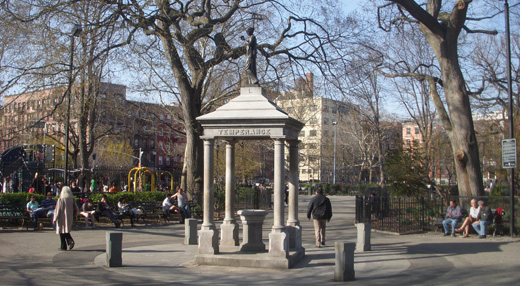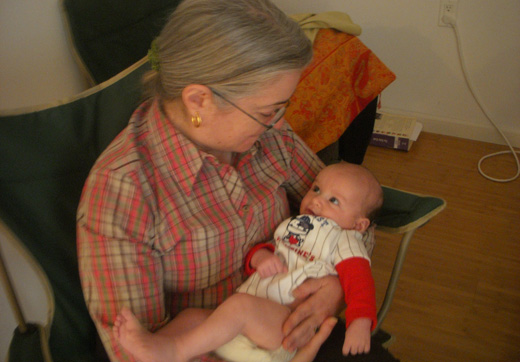Dear Diary: Long-Winded
Wednesday, March 31st, 2010
An agreeable day: up by eight, paper done by nine, with tea and toast for Kathleen.
Off to work. At 9:30, the door opens. That can’t be Kathleen leaving! And it isn’t; it’s Sonja. Wednesday mornings are her new (and much better) “day.”
Kathleen leaves at 10:30, as I am just wrapping up the Office. (Choosing the links, that is; I’ll write the DO up later.) She stops by the super’s office and tells them about the broken dishwasher, which isn’t broken really. It’s not working because the intake filter is gunked up. The super himself will confirm this in the afternoon. He will arrange for the mechanic’s visit on Monday. I can live with that. The dishwasher belongs to us, not to the building; it’s pricey Miele. We’ve upgraded every appliance in the house. Another thing: we’ve never had the building paint the apartment, something that they’re obliged to do every three years. We may weaken on this point. Nobody else wants to do the job, for love or money. We are tired of the Russian émigré look.
Instead of writing, I launch a maintenance project. I have graduated to that sort of thing. In the old days, it was always a matter of dealing with impossible messes, Augaean stables. There was no mess today. Instead, a lot of small-scale disorder. Too boring to discuss, but very satisfying to knock off. In the end, a byprodut of three shopping bags. Plus the Bag of Crap.
The Bag of Crap used to be the Box of Crap.  Either way, it deserves a separate entry. Let’s just say that the box had to be forgone when, filled to the brim and beyond, it missed the shelf and dumped out all over the floor. Here’s a promise: I’ll photograph the contents of the Bag of Crap. Pester me if I don’t!
Throughout the tidying — moving chairs and upending tables so that I can vacuum the carpet beneath them, but no big deal really; this is no do-rag day by any means — I cannot get over the flush of satisfaction that overcomes me all the time these days. It’s the same flush that tells eighteen- and nineteen-year-olds that they’re really grown-up now! The sense of having gotten the hang of things. I have spent much of the past six months splashing in the puddle of this flush. Getting the hang of things, in spades! Â
Did you know, for example, that a dishwasher makes the perfect dishrack? For drying dishes? You wash things in the sink and then slot them in the nice clean dishwasher. No dishrack in the world holds as much as a dishwasher! And then, first thing in the morning, you put all of yesterday’s dishes away. I’m not saying that this is a brilliant idea. I can think of at least twenty women who would have advised me (mordantly — we’re only human) to give it a try. But it is a very useful idea, and I seem to have at least three really useful ideas every week. Being a fallapart 62 years of age, I really do have to ask, “What took so long?”
Shortly after five, I get dressed and run two First Avenue errands. First stop: Morning Calm Gallery. Another separate entry. Second stop: Agata & Valentina, where I pick up the ingredients for my ragù and then add enough other stuff to round out the bill to $75. (More than a third of that goes to oversized red snapper filets.)
Home from the errands, I sit on the balcony for the first time in 2010 and read the LRB. Don’t get me started on how lucky I feel. If the dishwasher were working, I’d wash all the items on the balcony table that have been sitting out there all winter, plates, bowls, bottles, teapots, whatnot; stuff that has to find a new place. Something tells me that it will find its new place without having been dishwashed first. My parsley plantation, by the way, could not be more robust. Another separate entry: how crazy am I to eat parsley that has grown in soil that gets a fresh coat of lampblack pollution every day? Mayor Bloomberg: New Yorkers have respiratory diseases because of the trucks, not because of the cigarettes! Let me tell you about my Venice Plan for Manhattan.
Eventually, I go indoors and write up the links. This takes longer than usual because I get choosy. In the end, Compline is the original choice but Prime and Tierce are replaced. As soon as I’ve uploaded the pages, I throw the bunch of stuff on the bed into shopping bags, and the shopping bags into stout canvas tote bags, and head off for Westphalia. I am in and out of storage in less than five minutes. I call Kathleen at the office. Leaving storage, I say, “I’m crossing First Avenue,” meaning that it will take about ten minutes to reach our rendez-vous at Lex and 62nd. Twenty minutes later, just after the waitress at Mon Petit Café (I’m not making this up) advises me that the kitchen will be closing shortly, Kathleen calls from First and 62nd. “Where is this place?”
Everything works out well, I have onglet, Kathleen has boeuf bourguignon. We have a good talk about the Hours of Catherine of Cleves, even though Kathleen hasn’t seen them in the flesh (she loves the catalogue). Trust me: the people lucky and/or provident enough to see the show at the Morgan are not going to shut up about it for The Rest of Their Lives. Think really, really seriously about missing this show if seeing it is an option.
Speaking of seeing things, our tickets for the revival of Lend Me a Tenor arrived yesterday. We’ll be a party of six. What fun that’s going to be! The play will be fun, too. One of these days, don’t you know, we’ll be treated to a show that begins with series of actors reading a series of blog entries. They’ll be playing characters who are writing about the same event, but from surprisingly different perspectives. The rest of the play will be repair. Rashomon not so much.
Sometimes, it’s heaven to be sixty-two. What I won’t have to live through.

















